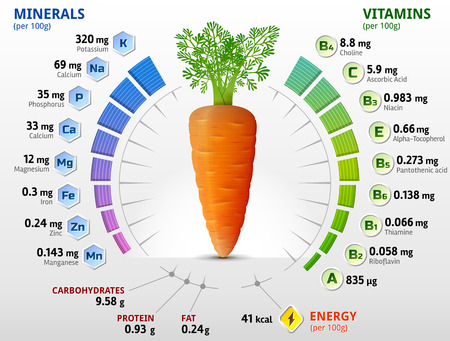Vitamins and minerals are substances your body needs in small amounts for normal growth, function and health. Together, vitamins and minerals are called micro-nutrients. Your body cannot make most micro-nutrients. Thus, each of us must acquire them from the foods we eat or from supplements such as those sold in many health-food stores.
We have several problems when trying to obtain adequate amounts of vitamins and minerals and also a good quality vitamin and mineral product. For decades, farmers that furnish food to the general population generally have grown that food in the same fields year after year. During this process soil nutrients that are taken up by plants gradually diminished resulting in a less nutritious plant each growing season. Over time, plant growth and yields diminished. As a result, farmers added fertilizers to the fields to enhance plant growth. However, these fertilizers were in the form of nitrogen, phosphorus, and potassium (these three are called plant macro-nutrients).
While this process has increased yield back to normal levels, the micro-nutrients used by the plants were not replenished by the farmer each season, only the nitrogen, phosphorus, and potassium. This has resulted in less and less vitamins and minerals in the same food products each year than there was in previous years. Thus, the vitamin and mineral content has steadily declined in the vegetables and plant products we eat each year so that to get the same amount we should, we have to eat more of them. This means eating more calories, which is what many of us do not wish to do.
The answer to this problem is to take vitamin and mineral supplements to enhance the foods we eat and to ensure that we are receiving adequate amounts of these substances. This is especially true for those who workout on a regular basis and are more active as a result. Before discussing this, lets look at the importance of vitamins and minerals and what they do. A synopsis, i.e., tables of individual functions for what vitamins and minerals do can be found at the end of this article.
Vitamins
You need vitamins for normal body functions, mental alertness and resistance to infection. These substances enable your body to process proteins, carbohydrates and fats. Certain vitamins also help you produce blood cells, hormones, genetic material and chemicals in your nervous system. Unlike carbohydrates, proteins and fats, vitamins and minerals don’t provide fuel (calories) but, they do help your body release and use calories from food.
There are 14 vitamins that fall into two categories:
Fat-soluble: Vitamins A, D, E and K. They’re stored in your body’s fat. Some fat-soluble vitamins, such as vitamins A and D, can accumulate in your body and reach toxic levels.
Water-soluble: Vitamin C, choline, biotin and the seven B vitamins: thiamin (B-1), riboflavin (B-2), niacin (B-3), pantothenic acid (B-5), pyridoxine (B-6), folic acid/folate (B-9) and cobalamin (B-12). They’re stored to a lesser extent than fat-soluble vitamins.
Minerals
Your body also needs minerals. Major minerals that are required in larger amounts include calcium, phosphorus, magnesium, sodium, potassium and chloride. Calcium, phosphorus and magnesium are important in the development and health of your bones and teeth. Sodium, potassium and chloride, known as electrolytes, are important in regulating the water and chemical balance in your body. In addition, your body needs smaller amounts of chromium, copper, fluoride, iodine, iron, manganese, molybdenum, selenium and zinc. These are all necessary for normal growth and health.
Balance
The proper balance of vitamins and minerals within your body is essential. Prolonged vitamin or mineral deficiencies can cause specific diseases or conditions, such as night blindness (vitamin A deficiency), pernicious anemia (vitamin B-12 deficiency) and anemia (iron deficiency). By comparison, too much of some vitamins and minerals can cause toxic reactions.
You can get your entire daily requirement of vitamin C by just popping a pill. You can get the same amount by eating a large orange. So which is better? In most cases, the orange, which is a whole food. The main advantage is that it will provide both fiber and also other vitamins and minerals.
Benefits of Whole Foods
Whole foods such as fruits, vegetables, grains, lean meats and dairy products have three primary benefits you can’t find in a pill:
- Whole Foods are Complex. They contain a variety of the nutrients your body needs, not just one, giving you more value for your money. An orange, for example, provides vitamin C but also beta carotene, calcium and other nutrients. A vitamin C supplement lacks these other nutrients. Similarly, a glass of milk provides you with protein, vitamin D, riboflavin, calcium, phosphorus and magnesium. If you take only calcium supplements and skip calcium-rich foods, such as dairy products, you may miss all the other nutrients you need for healthy bones.
- Whole Foods Provide Dietary Fiber. Fiber is important for digestion and to help prevent certain diseases. Soluble fiber that is found in certain beans and grains and in some fruits and vegetables, as well as insoluble fiber that is found in whole grains and in some vegetables and fruits, may help prevent heart disease, diabetes and constipation.
- Whole Foods Contain other Substances that may be Important for Good Health. Fruits and vegetables, as an example, contain naturally occurring food substances called phytochemicals that may help protect against cancer, heart disease, osteoporosis and diabetes. Although it’s not known precisely what role phytochemicals play in nutrition, research shows many health benefits from eating more fruits, vegetables and grains. If you depend on supplements rather than eating a variety of whole foods, you miss the potential benefits of phytochemicals.
Benefits of Supplements
The benefits of supplements is for enhancement and to ensure adequate amounts of vitamins and minerals are obtained. The supplement you decide to use must be chosen with care. In fact, some nutrients may actually be harmful to your health when taken as a supplement. In one study, researchers found an increased risk of prostate cancer among men who drank alcohol and took beta carotene supplements.
In an earlier study, they found that smokers who took beta carotene supplements had an increased risk of lung cancer. It’s possible that alcohol and tobacco change the way your body absorbs and uses beta carotene. In addition, large amounts of beta carotene can alter blood levels of other, similar natural food pigments called carotenoids, some of which may actually be more beneficial to you than beta carotene.
Thus, while we should concentrate on obtaining most nutrients from food, those that cannot be obtained in an adequate amount or because of a hurried lifestyle can be adequately obtained from a good supplement manufacturer. At MyHealthandFitness, we want you to understand that supplements are not substitutes for good nutritious food. They are called supplements because they supplement what you may not obtain from your food(s) of choice. They can’t replace the hundreds of nutrients in whole foods you need for a nutritionally balanced diet.
We have taken the guesswork out of choosing a supplement for yourself. First we will tell you what to look for in choosing a supplement and second, why the supplements we have chosen and had manufactured for us to fit you are the best you can get.
If you do decide to take a vitamin or mineral supplement, here are some factors to consider:
Avoid supplements that provide “megadoses.” In general, choose a multivitamin-mineral supplement that provides about 100% DV of all the vitamins and minerals instead of one that supplies, for example, 500% DV of one vitamin and only 20% DV of another. The exception to this is calcium. You may notice that calcium-containing supplements don’t provide 100% DV. If they did, the tablets would be too large to swallow. Most cases of nutrient toxicity stem from high-dose supplements.
Look for USP on the label. This ensures that the supplement meets the standards for strength, purity, disintegration and dissolution established by the testing organization, U.S. Pharmacopeia (USP).
Beware of gimmicks. Synthetic vitamins are the same as so-called “natural” vitamins. Don’t give in to the temptation of added herbs, enzymes or amino acids they add nothing but cost unless they have a very specific function and are specifically or biochemically designed for ingestion with various other supplements.
Look for expiration dates. Supplements can lose potency over time, especially in hot and humid climates. If a supplement doesn’t have an expiration date, don’t buy it.
Store all vitamin and mineral supplements out of the sight and reach of children. Put them in a locked cabinet or other secured location. Don’t leave them sitting out on the counter or rely on child-resistant packaging. Be especially careful with any supplements containing iron. Iron overdose is a leading cause of poisoning deaths among children.
Store supplements in a dry, cool place. Avoid hot, humid storage locations, such as the bathroom.
Explore your options. If you have difficulty swallowing, ask your doctor whether a chewable or liquid form of the vitamin and mineral supplements might be right for you.
Play it safe. Before taking anything other than a standard multivitamin-mineral supplement of 100% DV or less, check with your doctor, pharmacist or a registered dietitian. This is especially important if you have a health problem or are taking medication.
High doses of niacin, for example, can result in liver problems. In addition, supplements may interfere with your medications. Vitamins E and K, for example, aren’t recommended if you’re taking blood-thinning medications (anticoagulants) because they can complicate the proper control of blood thinning. If you’re already taking an individual vitamin or mineral supplement and haven’t told your doctor, discuss it at your next checkup.
See the following tables for good food sources of vitamins and minerals.
Table 1: Vitamins
| Type | Benefit(s) | Source(s) | Quantity |
|---|---|---|---|
| Vitamin A | Vitamin A helps prevent eye problems, promotes a healthy immune system, is essential for the growth and development of cells, and keeps skin healthy. | Good sources of vitamin A are milk, eggs, liver, fortified cereals, orange or green vegetables, such as carrots, sweet potatoes, pumpkin, spinach, and broccoli, and orange fruits such as cantaloupe, apricots, papayas, and mango’s. | About 700- 900 micrograms of vitamin A each day. Usually, for teens, if you’re taking an acne medicine such as Accutane, don’t take vitamin A supplements. A continued excess of vitamin A can build up to dangerous levels in one’s body resulting in headaches, yellow-orange changes in skin color, and even liver damage. |
| Vitamin C (ascorbic acid) | Vitamin C helps form connective tissues; promotes healthy capillaries, gums, and teeth; aids in the body’s absorption of iron and calcium; and protects the body against certain illnesses. | You’ll find high levels of vitamin C in strawberries, kiwis, bell peppers, tomatoes, potatoes, and juices made from guava, grapefruits, and oranges. | About 65-75 mg (milligrams; 1 milligram equals 1,000 micrograms)of vitamin C a day. Athletes are known to take as much as 6-8 grams per day. |
| Vitamin D | Vitamin D strengthens bones. | Your body manufactures vitamin D from sunlight! You also get vitamin D from milk, butter, margarine, and some breakfast cereals. | About 2-3 micrograms per day. Teens need 5 micrograms of vitamin D from food sources every day, more than adults do. |
| Vitamin B12 | Vitamin B12 promotes normal growth and development and is important for the manufacture of red blood cells. | Vitamin B12 is added to some breakfast cereals. It’s found naturally in fish, including trout and salmon, and in beef, poultry, milk, cheese, and eggs. | About 1.4- 2.4 micrograms of vitamin B12 daily. |
| About 1.4- 2.4 micrograms of vitamin B12 daily. | Vitamin B6 is important for the brain to function normally. It also helps the body build proteins needed for proper growth and development. | A wide variety of foods contain vitamin B6, including poultry, fish, pork, beef, nuts, beans, eggs, vegetable juices, bananas, avocados, and fortified cereals. | About 1.0- 1.3 mg of vitamin B6 daily. |
| Thiamine (vitamin B1) | Thiamine helps keep the nervous system healthy. | It’s found in many different foods including yeast, whole-grain breads and cereals, enriched pastas, rice, beans, ham, oranges, nuts, and raisins. | About 1.0-1.2 mg daily. |
| Niacin (vitamin B3) | Niacin lowers blood cholesterol levels and helps the body use other nutrients effectively. | Good sources are fortified cereals, oatmeal, chicken, peanuts, canned tuna, and peanut butter. | About 12-16 mg of niacin daily. |
| Riboflavin (vitamin B2) | Riboflavin is essential for the production of energy in the body and for normal growth of body tissues. | Best sources of riboflavin are almonds, dairy products, avocados, dried fruit, fortified cereals, pork, broccoli, spinach, and asparagus. | About 0.9-1.3 mg of riboflavin daily. |
| Folacin (folic acid, folate, and vitamin B9) | Folacin is essential for normal tissue growth and for keeping the heart healthy. | Leafy green vegetables, nuts, beans (including garbanzo, lima, and navy), orange juice, and breakfast cereals are good sources of this vitamin. | About 400 micrograms of folic acid daily. |
Table 2: Minerals
| Type | Benefits | Sources | Quantity |
|---|---|---|---|
| Zinc | Zinc is important for normal growth and for sexual development. Your eyes, bones, skin, hair, and nails especially depend on zinc for their health. | Found in meats, including turkey, fish, and pork, in whole-grain breads made with yeast, and in milk, soybeans, and seeds. | About 9-12 mg (milligrams) of zinc a day. |
| Iron | Iron helps red blood cells carry oxygen to different parts of the body. People who don’t get enough iron from their diets often suffer from recurring headaches, chronic fatigue, and irritability. | Iron-rich foods include beef, pork, chicken, soybeans, lima beans, enriched pastas, fortified cereals, oatmeal, spinach, and dried fruits. | About 10-16 mg daily. Women need higher amounts because they lose iron through blood during menstruation. This puts them at higher risk for developing iron-deficiency anemia. |
| Calcium | Calcium is vital for building strong bones and teeth. | Milk is one of the best sources of calcium. You’ll also find this mineral in dairy products such as yogurt, cottage cheese, and pudding, in canned fish, and in fortified cereals and juices. | About 1,300 mg of calcium each day. |






